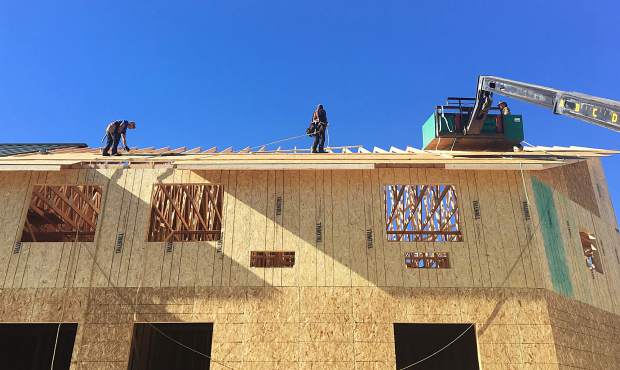Roofing scams have long been a problem on the Front Range, but this summer these shady companies have been moving into the mountains.
Jeff Johnston, president of the Colorado Roofers Association, explained that these scammers are often referred to as “hail chasers.” Following large hailstorms, which have been incredibly common along the Front Range the past few years, these companies sweep neighborhoods offering below market rates and leaving local homeowners with a mess.
There hasn’t been much hail this year, so the companies — Johnston estimates there are about 2,000 in the state — have been looking for other places to profit in Colorado.
“They’re like rats jumping off a sinking ship,” Johnston said. “They’re grabbing a hold of everything they can.”
They moved west, Johnston said, explaining he has seen an “onslaught” of them in the last two months. He’s already dealt with three or four situations this year around Grand, where these scams are usually nonexistent.
“They left the biggest mess I’ve ever seen in my life,” he said of a recent local job. “The owners are just not happy at all.”
What makes these companies appealing to consumers is the below market prices. Johnston said scam prices tend to be about 30-40% below what a reputable business charges.
The scammers can afford to do this because they cut corners, Johnston explained. They provide poor quality roofs, don’t pay their bills, charge for work that wasn’t done and schedule inconsistently, often leaving messes untouched for weeks.
These companies are also not members of the Colorado Roofers Association. To join, a roofing company must sign an ethics agreement and pass a yearly workers’ compensation audit. While cheaper to do, the liability of an injury on the job could go to the homeowner if the company doesn’t have its own insurance and workers’ compensation.
One of Johnston’s biggest concerns about the scammers coming to the mountains is the lack their lack of experience in alpine environments.
“This is a whole different world,” Johnston said. “They don’t have any concept of it at all.”
Having spent more than 35 years working on alpine roofs, Johnston knows that only specific materials work well long-term in the mountains. There’s also special knowledge needed to prevent ice dams on roofs, something even qualified roofers in the Front Range often lack experience in.
Local roofing companies with longtime reputations in the county are the best bet for consumers.
“The local guys know how to roof up here,” Johnston added.
Checking references and the company’s paperwork, including insurance and licensing, is a good way to verify their reputation. Colorado does not have a statewide roofing license or registration requirement, but any companies working on a roof must be listened and/or permitted within the jurisdiction where the work is performed.
Johnston wants to protect the consumer as much as possible. With the scammers coming up here, he fears he’ll be cleaning up their mess next summer.
“They’re telling the owners whatever they want to hear,” he warned. “People are going to get burned.”
- Contractor licensing: If a contractor gives you a license number, confirm it with the building department to see if the number was issued and if it is current.
- Insurance: Verify proof of insurance before signing any contract. Any reputable roofing contractor should be willing to have their insurance agent send documents directly to you, and workers’ comp can be verified at http://www.ewccv.com/cvs.
- Warranties: A contractor should be able to offer at least a two-year labor warranty, along with the manufacturer’s warranty for the products. Ask how long and to what extent these warranties cover.
- Roof inspection: Following the roofer’s work, ask if the contractor offers an inspection to ensure the roof will perform properly.
- Estimate: Make sure you receive a specific, written estimate of what the work might entail. The estimate should include pulling a permit, as that is the responsibility of the contractor and not the client.
- Reputation: Check to see if the contractor belongs to any associations such as the Colorado Roofing Association, the National Association of Homebuilders and/or the Better Business Bureau. The contractor should also be able to give client references.

